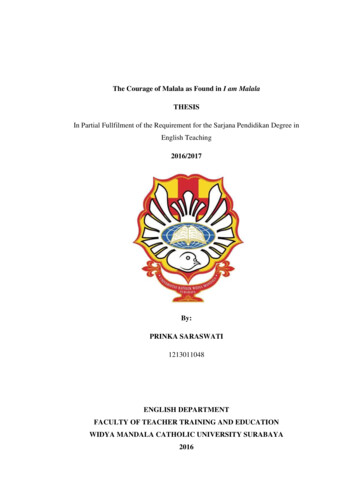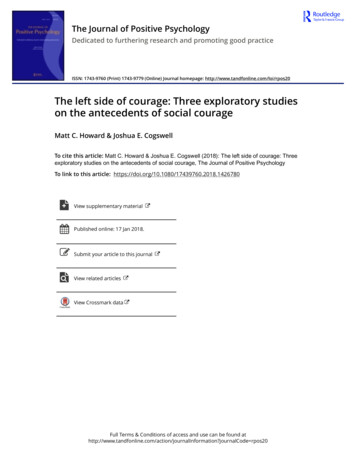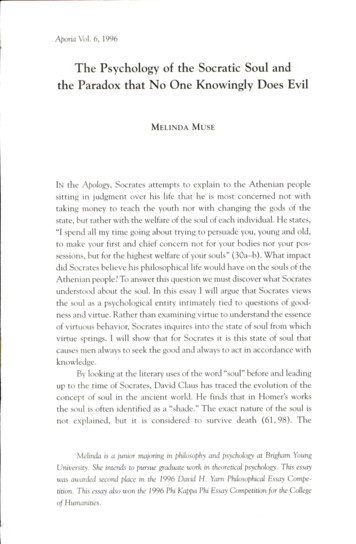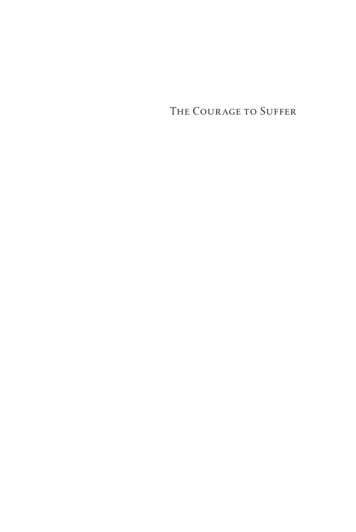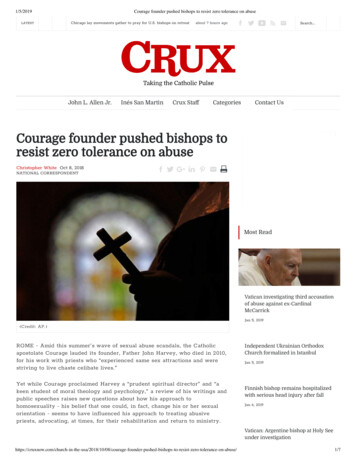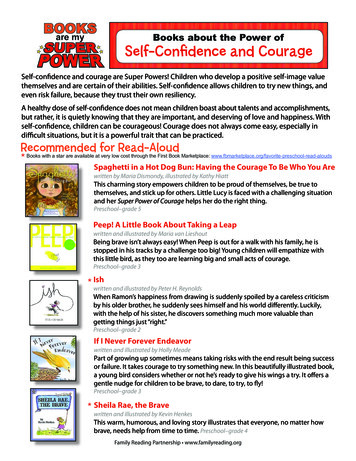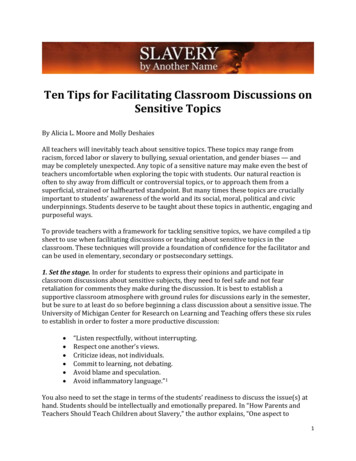
Transcription
VISTAS OnlineVISTAS Online is an innovative publication produced for the AmericanCounseling Association by Dr. Garry R. Walz and Dr. Jeanne C. Bleuerof Counseling Outfitters, LLC. Its purpose is to provide a means ofcapturing the ideas, information and experiences generated by theannual ACA Conference and selected ACA Division Conferences. Paperson a program or practice that has been validated through research orexperience may also be submitted. This digital collection of peer-reviewedarticles is authored by counselors, for counselors. VISTAS Online containsthe full text of over 500 proprietary counseling articles published from2004 to present.VISTAS articles and ACA Digests are located in the ACAOnline Library. To access the ACA Online Library, go tohttp://www.counseling.org/ and scroll down to the LIBRARYtab on the left of the homepage.nUnder the Start Your Search Now box, you may searchby author, title and key words.nThe ACA Online Library is a member’s only benefit.You can join today via the web: counseling.org and viathe phone: 800-347-6647 x222.Vistas is commissioned by and is property of the American CounselingAssociation, 5999 Stevenson Avenue, Alexandria,VA 22304. No part of Vistas may be reproduced without expresspermission of the American Counseling Association.All rights reserved.Join ACA at: http://www.counseling.org/
Suggested APA style reference:Blagen, M., & Yang, J. (2009, March). A tool of facilitating courage: Hope is a choice. Paper based on a program presented at theAmerican Counseling Association Annual Conference and Exhibition, Charlotte, NC.A Tool of Facilitating Courage: Hope is a ChoiceBased on a program presented at the ACA Annual Conference & Exhibition,March 19-23, 2009, Charlotte, North Carolina.Mark Blagen and Julia YangBlagen, Mark, T., Ph.D., CAC, is an Assistant Professor of Human Services at University of Illinois atSpringfield. Dr. Blagen has been a Certified Addictions Counselor since 1990 and has taught addictionscourses since 1992. His primary research interests include defining the spiritual dimensions of addictionrecovery, understanding the therapeutic factors of 12-step recovery, understanding the nature of naturalrecovery, and investigating the relationship of purpose in life and the use of alcohol and other drugs.Yang, Julia, Ph.D., is a University Professor of Counseling at Governors State University. Her research andpractice has focused on identifying and counseling at risk adolescents and understanding the concept ofcourage from an Adlerian psychology perspective.Problems of living today seem worse now than ever as fear dictates our thoughts,feelings, and actions at home, school, and work and in our society. For many the goal ofliving a happy life seems unattainable; fear permeates their whole being! Courage hasgenerally been overlooked in the psychological literature. In fact, psychology has takenmuch more interest in the analysis of fear rather than cultivating its counterpart, courage.The purpose of this paper is threefold. First, the authors will elaborate howIndividual Psychology is a psychology of courage. Secondly, the elements offacilitating courage will be discussed. Lastly, a tool of facilitating courage: “Hopeis a Choice” is included to illustrate the processes of encouragement.The Psychology of CourageWhy is living in this world so difficult? Existentialist philosophers andpsychologists have called the problems of the 20th century apathy. People who wereoverwhelmed by fears and anxiety escaped into a state of feelinglessness [affectless]space and were unable to affect the world around them (May, 1950/1977). These themesof attitudes of “mind your own business” and “it doesn’t matter” have endured into the21st century when the quiet, depressive apathy has turned into hostility toward self andothers.Mental health is not the absence of mental illness. It is not enough for psychologyto only point to the presence or absence of disease. We are more resilient than most of thepsychological theories are willing to describe. Psychology, therefore, must recognize andembrace the values that promote and prepare the individual to undertake the problems ofliving. We need a psychology that can help us face fears, overcome our inadequacies,care for one another, endure suffering with courage and hope, and live in harmony withoneself, family, community, and humankind.
To Alfred Adler, the answer to apathy and the road to happiness (or better put, themeaning of life) is the courage for community feeling. The criterion for the healthy socialliving, for Alfred Adler, was the extent to which the individual experiences belonging viacontribution and cooperation. The feeling of community can inspire and prepare us toface life problems with courage and to take responsibility for ourselves and others.Individual Psychology operates from the following principles:1.2.3.4.5.6.7.8.9.10.We are social beings. The meaning of life is to achieve belonging andsignificance via cooperation and contribution in the interest of our fellowhumankind.All behaviors have a purpose of achieving social significance and belonging.We are whole beings (i.e., thinking, feeling, and acting); all aspects of life areinseparable (i.e., work, love, friendship/family/community, harmony with selfand others).We make meaning of our early experiences and act within this frameworkthroughout our lives.Life is movement. We are endowed with creative power to overcome,compensate and strive toward a guiding goal of perfection.Perfection is fiction. When we strive for perfection, we are bound toexperience problems of overcompensation or under compensation.Equality presupposes belongingness. Problems of living stem from theindividual inferiority as well as collective inferiority.Courage and social interest are universal values, which are both the ends andmeans of personal and social well being.Personal freedoms exist together with social responsibility.Happiness is the goal of global humanity. It is attainable when individuals andsocieties recognize the strengths from within and without that cultivate thecourage of social living (Yang, Milliren, &Blagen, 2009).Adler was the pioneer to the systems thinking that we are only part of the wholeand thus, life is never perfect for the individual. The discouraged individual operatesfrom the fear of failure, lacks acceptance and courage for imperfection. The discouragedindividual resorts to an exaggerated feeling of inferiority that propels his/her excessiveattempts to strive toward success by overcompensation or self preservation by undercompensation or evasion in some or all life tasks.We believe that Adler’s mature theory is the psychology of courage that providesus the best road map by which the virtue of courage is teachable. Our fear of rejectionand failure is the root of all problems. Comparison and competition is our typical copingmethod in the home, at school, and at work. When living becomes difficult, we tend torespond to challenges with overcompensation, under compensation, or total evasion ofone or more life tasks. The answer to these difficulties is courage. Change is possiblewhen we modify our attitude of self interest to social interest by the courage to cooperateand to contribute.
From Fear to CourageWhen we operate from fear, we allow fear to dominate our thoughts, feelings, andactions. We often respond to fears with what would lead to a momentary sense of okayness or control within ourselves or with others. When fear outweighs our problem, itmakes our development and adjustment challenging as we relate to ourselves and theworld. When we are constant captives of fear, we become restricted and blind to theworld and what it can offer. Fear can stop our forward movement. In our extreme fear,hostility toward self and the other (instead of harmony) becomes the prevalent way ofresponse to conflict. In our inFEARority, living becomes helpless, hopeless andmeaningless. In our fears of defeat or not making it, we feel inferior!Fear and inferiority work to either propel us for socially useful action or lead us tothe feeling of inadequacy. Inadequacies are safeguarding devices that deprive us from ourfreedom and responsibilities of living. Instead of contributing to the main tent ofcommunity life, fear and inferiority encourages us to create sideshow activities thatdistant ourselves from resolving the problems of love, work, and friendship.As fear is manifested in inferiority, courage is present as the creative power thatmotivates the individual’s movement toward his or her chosen goal. The timid orsafeguarding individual often meets challenges with blaming, wishful thinking, selfcentering, double mindedness, competition, fictional life goals, and other methods thatcreate a need for undue attention, power struggles, revenge, or depression. On thecontrary, the profile of a courageous individual is characterized by the absence of selfserving interest, safeguards, exploitation, superiority, and the presence of aesthetics,agape, altruism, courage, hope, empathy, meaning, endurance, movement, stillness,coherence, encouragement, reconciliation, wholeness, regeneration, and socialconnectedness.The threat to our courage comes largely from our lack of preparedness, which ismasked as our fear. The fundamental problem for an individual lacking courage is thefear of making mistakes. Our discouraged or “less than” feeling becomes worse when itis interlocked with a society that is mistake-centered. It seems as though the harder we tryto be good, or “better than”, the worse our problems will become. Our fear is mostlyguided by the fictional goal of perfection and the sense of superiority as compensation inresponse to our feeling of inferiority even when we are motivated by the desire to beuseful.On the other hand, our choice of socially useful activities defines goodcompensations that transform our perceived liabilities to assets such as socialresponsibility, closer contact with humanity, acceptance and conquest of difficulties, andsocial courage. Activities of good compensation lead, secondarily, to a sense of power, tosocial esteem, and to security. We can achieve social significance with useful attitudesthat reflect the courage of self-affirmation and the courage of participation in spite ofdifficulties as we meet the life demands of work, love, and social relations. To Adler,courage is a precondition to real cooperation by which we may move from the uselessside to the useful side of adjustment, to face life tasks, to risk mistakes, and to feel the
sense of belonging. A lack of courage, in contrast, breeds feelings of inferiority,pessimism, avoidance, and misbehaviors.Only those are able to muster the courage to advance on the useful sidewho consider themselves a part of the whole, who are at home on thisearth and in this mankind. (Adler, 1956, p.159)Overall, courage can be seen in the individuals whose characteristic attitudestoward life are optimistic, creative, and prepared to cooperate and contribute for thebenefit of other people. Lack of courage and social feeling, on the other hand, accountsfor all failures in social life. Courage is often seen in the development of a well-adjustedindividual who possesses a sense of social interest. Within this feeling, he/she is affirmedwith his/her self worth and his/her willingness to participate in social living.Processes of Facilitating CourageI do believe that life is just a day in school. All our experiences are butlessons in some form or other which condition us for our larger destiny.What matters, and what matters only is what we do with the problems.Bill W. in Cheever, 2004, p.43“How do we obtain and facilitate courage and social interest in ourselves and withothers?” Or better formulated, “How could we creatively facilitate healthy changes thatencourage individuals to develop a sense of self-worth and common purpose with acommunity feeling?”Yang et al. (2009) present numerous strategies and tools to facilitate courage.They believe the courage facilitator can be anyone who possesses social feeling andrecognizes the immediacy and value of courage with another fellow human being. thatthe courage facilitator is someone who gives courage in his/her relationships with selfand others. This implies that the courage facilitator is a warm human who holds more“Yes” attitudes than “No” attitudes. He or she acts as a whole person, and encouragesconfidently with feeling, sensitivity, and social purpose. The courage facilitator valuesquality in a relationship and sees change as a learning process that involves choice andconsequences.The courage facilitators attempt to understand individuals’ attitudes toward lifeand how they act upon problems of social living in early recollections, familyconstellation, and stories of the individuals. As the facilitators listen to the disclosures,they look for lifestyle themes or patterns in one’s thinking, feeling, and acting.Specifically, they facilitate the individuals’ understanding of their own narratives of theirstrengths, the “what should have been” and “as ifs” that could be theirdreams/needs/goals, problems and challenges, as well as usefulness and uselessness oftheir current problem resolution endeavors.Understanding how individuals adjust and adapt in the face of difficult life tasks,concerning both the welfare of themselves and others, allows the courage facilitators to
see these sources of discouragement and encouragement. Depending on whether there isan absence or presence of courage, the individual creatively chooses one path or the other.One could be mistakenly taking a pathway toward self interest or toward contributing andcooperating with one’s self and others on the pathway of social interest. The self-boundedindividuals are those whose style of social living can be described as pampered orneglected, in other word, discouraged, when only the encouraged individuals can displayother directedness.When defined using the spiritual root meaning of courage, encouragement is theprocess of development of one’s courage toward positive life movement. When looked atas a psychological concept, encouragement is the process of giving courage thatstrengthen the “psychological muscle” of a person. Encouragement can be used to“inspire, foster, stimulate, support, or to instill courage and confidence” (Dinkmeyer &Losoncy, as cited in Cheston, 2000).It is through encouragement that the facilitator gives courage, empowering theindividual to challenge his or her misdirected goals and see a new direction and takeactions. Through encouragement the facilitator helps the discouraged individual toactivate social interest and create meaning and purpose in life. In Adlerian literature, it isoften written that human beings need encouragement like plants need water.Encouragement thus has become the core of all interventions for those who experiencediscouragement. Both the professional and the lay person can use encouragement tofacilitate courage for change.To effectively facilitate change, the facilitator must be aware of the componentsof facilitation that sometimes are referred to as change processes or goals in theIndividual Psychology literature: Rapport building, psychological investigation, mutualunderstanding, and re-orientation. Always with encouragement, the facilitator wins overthe individual’s cooperation and works with him/her to establish and maintain a mutuallyrespectful relationship to redirect and take actions toward new life goals with newstrategies.ConclusionIndividual Psychology offers the most amendable framework that is open to acollaborative understanding of what courage is and how we may use courage to enhanceour social living. Adler is regarded as the father of self help and self psychology, and theforerunner for cognitive, existential, humanistic, and positive psychology. Adler’sthoughts of community and self help deeply influenced the cofounder of AlcoholicsAnonymous and the AA’s practices (Blagen, 2008). Such interconnectedness allows us awonderful opportunity to develop and compile tools by which we can uncover ourstrengths and train for courage that will endure the test of culture differences. Included inthe following is one of the twenty tools Yang et al. (2009) designed to facilitate courage.
A Tool of Facilitating Courage: Hope is a ChoiceRationaleWe live in a troubled world and we often work with individuals who struggle formeaning and spiritual direction. Hope, like courage, can produce endurance andencouragement for us in the face of fear and despair. In Individual Psychology thecourage to hope is manifested in our striving for a better future that brings not onlychange of our immediate living but also human progress. To hope is to live the goal ofthe future “as if” the future is realized in the present. Hope has the dynamic possibilitiesof transforming/self-transcendence. Hope is a way of thinking and believing that is goaldirected that produces routes to desired goals with the motivation to use those routes. It iswhen we are most vulnerable and powerless we are given the most profoundopportunities to risk believing that things will get better. Even in the most despairing oftimes each of us possess the power of choice. Facilitating hope in and of itself creates theopportunity for positive personal change (Blagen & Yang, 2008). It is in our hope for theultimate sense of belongingness that we fulfill our dreams of work, love, and socialrelationships so that we become connected beyond one’s self, away from isolation andself-absorption, and towards the greater community.Objectives1. To develop the understanding that hope is both a cognitive and emotional conceptthat allows one to move toward one’s goal2. To facilitate the person in need of hope to locate and enhance his/her motivation3. To facilitate the development of a plan that will be actively carried out4. To facilitate the self encouragement skillsInstructionsA. Identify a situation where the individual feels discouraged or experience losses.Help the person to express his/her emotional, behavioral or perceptional concerns.B. Assist the individual in a reason for changeC. Allow the individual to hold the conflicting viewsD. Use encouragement to increase the individual’s desire for changeE. Conduct strength assessment from client stories.F. Once the desire exists, assist the individual in understanding how best to enact thechange by developing a planG. Identify life style themes (or life attitudes) that present challenges to theindividual’s implementation of the plan using early recollection or familyconstellation.(Hope Worksheet )H. Identify disjunctive emotions relate to the decision to change or not to changeI. Reinforce hope by facilitating self encouragement using family motto or spiritualaffirmation (Sori and McKinney, 2005).
Hope WorksheetSituation eal Goal DesiredPlan or StrategiesLife TasksFamily Constellation –Work –Love –Friendship –Family –Community –Self –Universe –I am –Others are –The world is –God is or Life Is –Early Recollections tiesDirections 2SelfEncouragementI have –Others have –I am –Others are –I can –Others can –I will –Others will –Replace disjunctive emotions withconjunctive feelings.Family motto –Spiritual affirmation –Note: Examples of disjunctive feelings are: sad, dejected, disappointed, glum, lazy, hostile, depressed,nervous, blue, fearful, timid, hateful, spiteful, apathetic, anxious, resistant, numb, jealous, envious, etc.Conjunctive feelings are love, admirable, like, hope, happy, pleased, glad, enthusiastic, interested, curious,confident, toward, accepting, grateful, etc.
ReferencesAdler, A. (1956). The individual psychology of Alfred Adler: A systematic presentation inselections from his writings (H. L. Ansbacher & R. R. Ansbacher, Eds.). NewYork: Basic Books.Blagen, M. (2008). The best kept secret: Adler’s influence on A.A. Manuscript inpreparation.Blagen, M. T. & Yang, J. (2008). Courage and hope as factors for client change:Important cultural implications and spiritual considerations. In G. Waltz, J. Bleuer,& R. Yep (Eds.), Vistas 2008. Alexandria, VA: ACA.Cheever, S. (2004). My name is Bill. Bill Willson: His life and the creation of AlcoholicAnonymous. New York: Simon & Schuster.Cheston, S. E. (2000). Spirituality of encouragement. The Journal of IndividualPsychology, 56, 296-304.May, R. (1950/1977). The meaning of anxiety (rev. ed.). New York: W.W. Norton &Company.Sori, C., & McKinney, L. (2005). Free at last! Using scriptural affirmation to replace selfdefeating thoughts. In K. B. Helmeke & C. F. Sori (Eds.), The therapist’snotebook for integrating spirituality in counseling: Homework, handouts, andactivities for use in psychotherapy. New York: Haworth Press.Yang, J., Milliren, A. & Blagen (2009). The psychology of courage: An Adlerianhandbook of healthy social living. New York: Taylor & Francis.
Individual Psychology is a psychology of courage.Secondly, the elements of facilitating courage will be discussed. Lastly, a tool of facilitating courage: “Hope is a Choice” is included to illustrate the processes of encouragement. The Psychology of Courage Why is living in

